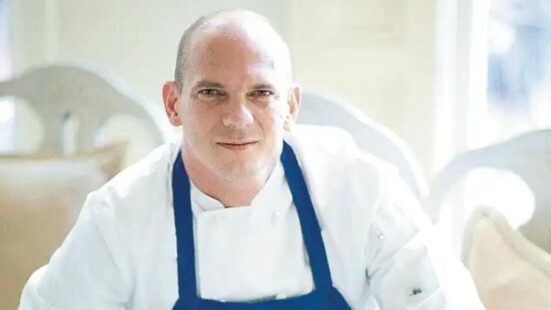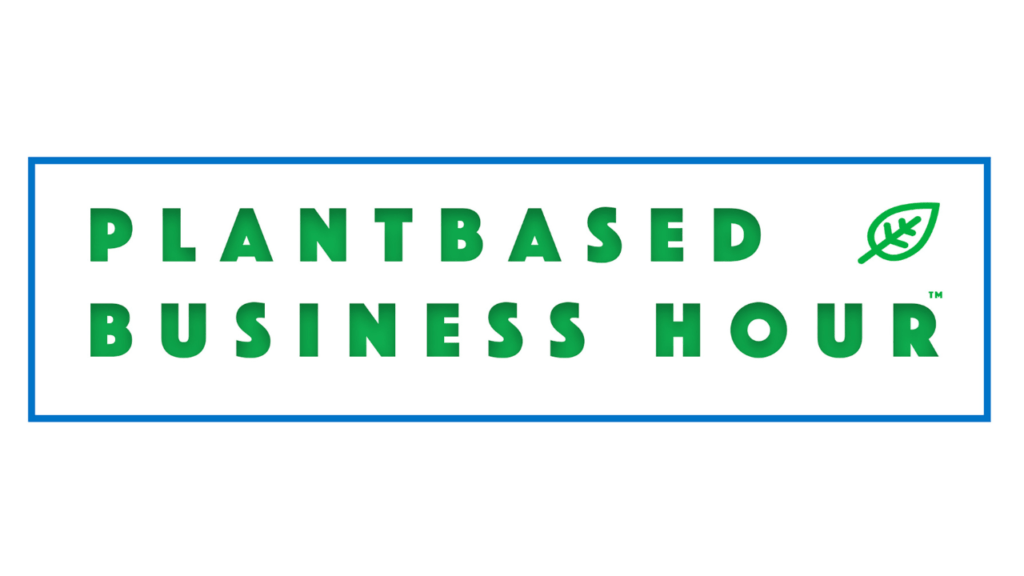
In this episode of the Plantbased Business Hour with Elysabeth Alfano, Elysabeth discusses the future of food with Chef James Corwell at the Culinary Institute of America‘s event in Napa Valley.
After an in-depth panel and primarily plant-based lunch with wine pairings, the two re-cap the highlights of the event.
Since this podcast was audio only there is no video clip. Below is the transcription of the interview with Chef James Corwell.
Elysabeth: Hey everybody it’s the Plantbased Business Hour. I’m Elysabeth Alfano, CEO of VegTech Invest. So happy to be with you here from St. Helena in the Napa Valley region. I’ve been speaking at a future of food symposium for the Culinary Institute of America, headed up by Chef James Corwell, who’s cooking for everybody in addition to have about seventy kind of really Silicon Valley energy tech people who came on down to have great food from Chef James, as well as to understand, “Hey, is the food revolution the next revolution after energy?”
It was an awesome conversation with my fellow colleagues, Isha Datar from New Harvest and Shayna Fetig from the Good Food Institute, me of course, Chef James Corwell and Evan Harrelson from Kiss the Ground which has a new movie out. So it was a wonderful panel and I’m here with Chef James to kind of recap what the heck went down. First of all, Chef James, tell us what your overall thoughts were today and tell us what you are working on in the kitchen.
Chef James Corwell: Sure, my overall thoughts today is I think everybody left with a greater understanding about the direction of food and why it’s going that way and how to invest in it. You know, there’s a lot going on in this space and I think they were here to learn all that we knew. I think they left with a head full of new knowledge for sure but not only that, they got to taste what the future of food looks like. So it was a mixture of plant-based, a mixture of meat that had been somewhat stretched using mushrooms, and then just other great vegan products that we had out there. So a great time for all for sure. The best one ever for YPO.
Elysabeth: Yeah, so this was the Young Professionals Organization taking place at the Culinary Institute of America right here in St. Helena, the Napa Valley region. When you think of Napa Valley, you think of generational landowners, people who are making grapes, people who understand food and beverage, but maybe they’ve been brought up on meat and dairy and not really understanding that that’s got to shift. So we had a highly educated group, and yet we had a group generationally invested in food personally and financially, but then they also know something is about to shift and they’re not sure what. So if you could sum up, James, what do you think the audience took away from today and what are the biggest points of interest for them?
Chef James Corwell: So I think what people took away from the symposium is that maybe they’re not ready for a dietary change but they see it coming and their people are into it. Their kids are into it. And I think they understand that feeding the masses, there’s a need, and with that need comes an opportunity for financial margin increase. So yeah, I think because you’re here, Elysabeth, they’re ready to invest. The dollar bills are ready to fly.
Elysabeth: So I saw two things. The folks in this audience know well that they know the land and they know food and so they’re probably always going to have the very expensive regenerative meat, but because very few animals are needed to till the soil and make it regenerative to get those carbon benefits, really you’re talking about very few animals. So you’re talking about very low supply, so you’re talking about the unit cost of meat being super expensive.
Chef James Corwell: The rest of us need plant-based to really feed the masses.
Elysabeth: Yeah, our audience thought less about their own plate and more about, “Okay, I’m interested in gross systems shift because a lot of money can be made on shifting energy, shifting vehicles, shifting cell phones, and now it’s going to be food.”
Chef James Corwell: And national security, I mean food security is a huge issue that I don’t think anybody in the audience really knew that our food systems weren’t secure. So I think they left with a better understanding that having strong agriculture that’s varied and not mono-cultured can give us a stronger nation.
Elysabeth: Which is so exciting for the U.S. and also it’s stronger in a couple of ways, not just because we might be more food secure and less dependent on other nations. But other nations, if we can get them food, then we have less chance of invasion.
Chef James Corwell: I mean, whenever there’s a tragedy or some disaster in the world it always holds on the shoulders of the United States. Thank goodness because we’re good at helping people, but when the chips are really laid down it’s going to be plant-based here in the United States that comes to save the world.
Elysabeth: Yeah, we really all think that and believe that and so it was interesting to see this audience kind of intellectually get there. That while they may still have family farms, the rest of the world- this is the bubble within the bubble within the bubble. The rest of the world isn’t going that way and so there’s great systems shift ahead. Now one of the things we talked about is when this system shift is going to take place. Could you sum up for us where we landed at that?
Chef James Corwell: Yeah, I think you brought up a really good point that systems are happening faster than we think they are, the shift. So by 2030, it seems like there’s going to be somewhat of a tipping point. Definitely by 2050, the tipping point is already there. But, you know, when the oceans sort of become depleted, God forbid we lose our top soil, you know, we want to be proactive instead of reactive. So I like your five-year outlook that really is a time that, you know, there’s no more resting on our laurels.
Elysabeth: Yeah, I think you’re really going to feel it in the public market in three to five years, and I think you’re going to see a tipping point within five to ten years, getting us to the early 2030s, which is really exciting. So we talk a lot about the food system shift, maybe we can talk about your personal shift. You have a new business that maybe people don’t know about. What can you tell us?
Chef James Corwell: Yeah, so it has to do with Blue Dot Foods, which is my consulting company. It acts as an umbrella company that partners with other entities. The one major one right now is Sea Change. Sea Change is developing all kinds of analog meats and fish. So we had some today and they were very well received, I think, do you like it?
Elysabeth: It was very well received. Okay, so we had whitefish. It was so super food and everyone at the table- so they made a point of not putting all the speakers together. So I was at a table with a bunch of audience members, James was at a table with audience members, and other speakers were- we each had our own tables. My table was saying, “If you put this in a Long John Silver’s bun or whatever, I would never know the difference.”
Chef James Corwell: Hey, that’s a compliment.
Elysabeth: That’s a big compliment.
Chef James Corwell: That’s great news.
Elysabeth: So when do you think something like the whitefish from Sea Change might be out for the public and what will it cost?
Chef James Corwell: Yeah, it will be affordable. It’s like regular whitefish, there’s nothing too crazy about it. It’s just good technique and good attention to detail. So it’s clean, allergen free, no soy, no wheat. I’m very proud about that. Then it’s the pepperoni that I’m really excited about.
Elysabeth: Oh, you’re working on pepperoni? Well, don’t keep it from us. Tell us.
Chef James Corwell: The pepperoni looks just like real salami, bakes like real pepperoni, chews like meat, and again it’s all allergen-free, no wheat, no soy, and it’s ready for market.
Elysabeth: Is this a different company?
Chef James Corwell: No, it’s still part of Sea Change.
Elysabeth: So how can I get my hands on that pepperoni?
Chef James Corwell: Yeah, I had some upstairs here but all the guys ate it.
Elysabeth: Oh, those rat bastards. Is there any left?
Chef James Corwell: No, there’s not. We’re all gone. We’ll have a party and bring some.
Elysabeth: Both of us are so gosh darn tired after a very long preparation here for today’s panel. On our parting words what would you like to say coming out of today?
Chef James Corwell: Oh Elysabeth, you made this event quite special and your knowledge, what you have to say and what you share, you change lives. So just know that and it’s just really, really impressive to work with you in person.
Elysabeth: Well it is my dream to work with Chef James Corwell who is really himself embodying the future of food. Everybody be on the lookout for Sea Change. It’s been a great couple of days here in the Napa Valley region and the shift is upon us folks. Do your part and hit me up anytime. You can always find me on LinkedIn. You can find James Corwell on LinkedIn. Hit us up with any questions and thanks everybody for all you do.
Chef James Corwell: Thanks for being a part of the team.

New episodes are out every week. Never miss the Plantbased Business Hour or Minute. Subscribe on iTunes and Youtube, and sign up for the newsletter. Follow Elysabeth on Linkedin. For information on Plant Powered Consulting, click here.



